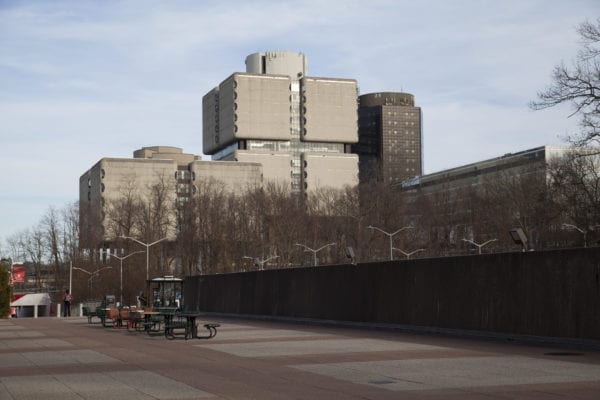
Two Stony Brook University hospitals have been named leaders in LGBTQ healthcare, according to the 2020 Healthcare Equality Index (HEI).
The index, released by the Human Rights Campaign (HRC), one of America’s largest LGBTQ advocacy groups, grades facilities based on their commitment to meeting the LGBTQ community’s needs. Stony Brook’s Southampton Hospital and University Hospital both achieved the highest score possible out of 100.
The grades are determined based on five major categories, which are then combined to reach the final score of the hospital: Non-Discrimination & Staff Training, Patient Services & Support, Employee Benefits & Policies, Patient & Community Engagement and Responsible Citizenship.
“The recognition of being ‘highly rated for LGBTQ* health’ is affirmation that our core values are being realized through our actions and moving in a positive direction,” Judith Clarke, vice president of equity & inclusion and chief diversity officer, said.
Both hospitals were two of the record 765 healthcare facilities that applied for the HEI 2020 Survey, according to the HRC.
Stony Brook Medicine’s LGBTQ* Committee was formed more than two years ago to help separate patients’ gender identification and sex at birth in the hospital’s electronic medical records, in order to better avoid misgendering patients.
Since then, the group has changed a number of hospital policies related to LGBTQ health to be more accommodating.
Dr. Allison Eliscu, who serves as co-chair of the LGBTQ* Committee, said LGBTQ healthcare covers an extensive amount of ground. It can range from HIV prep for gay patients, to cancer screenings or plastic surgery for transgender patients, among other needs, according to Eliscu.
“I think LGBTQ healthcare is having the sensitivity and awareness to not just ask the questions, but to know how to follow up [and] to know which people might be more at risk, so you can ask the better questions and provide appropriate counseling,” she said.
To the committee, it comes down to having a strong team that not only understands the issues at hand, but one that will also work with patients properly.
It took time to achieve standards worthy of a perfect score, according to Adam Gonzalez, director of Behavioral Health at Stony Brook Medicine and a member of the committee.
“As a part of our work, the Human Rights Campaign healthcare leader designation application was something that we tied into the committee to help improve Stony Brook Medicine as a facility and the care that we’re providing to the LGBTQ community,” Gonzalez said. “It is a great way for us to work on improving what processes and procedures operations look like to be noted in that healthcare service area.”
As explained by Director of Patient Education for Stony Brook University Hospital, nurse Rose Cardin and one of the co-chairs of the committee, the desire to achieve a perfect score for the HEI was present, but before the committee’s formation there was not the momentum to accomplish it, Cardin said.
“As soon as we started making the sterner changes, it quickly became apparent that we needed to focus on continuing education and bringing the awareness to people,” Cardin said.
These efforts can be felt by the student body, too.
Charles Scott, a senior journalism major and the vice president of the LGBTA, one of the largest LGBTQ clubs on the Stony Brook University campus, said these rankings were a step in the right direction.
“It’s reflective that we are an accepting campus. We have many people who, even if they aren’t fully immersed, are at least understanding,” Scott said. “That extends to the medical schools and the institutions of campus. It’s reassuring. It’s good to know that I can recommend our facilities on our own campus.”
Scott said that while the HRC’s rating does not mean that there are zero issues outside of the hospital’s scope that can be improved upon, like medical access for the less financially fortunate LGBTQ students, the hospitals’ rankings should still be celebrated.
Other changes — including the addition of 70 gender-neutral stalls in the Science Health Center and hospitals — have emerged because of the committee’s work, according to Gonzalez.
“As a gay man and an employee here at Stony Brook, it’s important to me that the school cares about the LGBTQ population and is making sure that this population, that our community, is being taken care of,” Gonzalez said.
For Eliscu, knowing that committee actions have made it easier for her to be respectful of her patients’ needs has made the process a worthwhile experience.
“When I have a patient come in, I now have their preferred name right there on my banner bar. Now, we can use that, rather than their birth name,” said Eliscu. “New patients appreciate that and feel comfortable going to the doctor. Those changes make me proud of our work.”
For Cardin, as an ally, the ranking serves as a reminder of why she has been a part of the Stony Brook Medicine family for over 30 years.
“We’re getting out there in the community so people know to come to us because we are the friendly place to come,” she said. “It’s an amazing thing for us to serve our community like we are truly meant to.”
Stony Brook University’s LGBTQ* Center didn’t respond to The Statesman’s requests for comment before this article was published.
Anyone seeking treatment with an LGBTQ-related health service can visit Stony Brook Medicine’s LGBTQ website.










